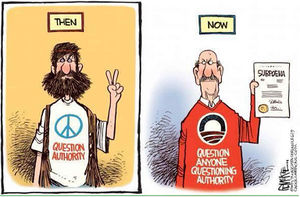Authority
(Idea, Statecraft) | |
|---|---|
 | |
| In addition to the standard meaning, "Authority" and "Authoritative" are sometimes used on Wikispooks not as an accolade, but to suggest distrust, reflecting the fact that 'the establishment' often seeks to bolster its power through specious claims of "authority". |
"I cannot accept your canon that we are to judge Pope and King unlike other men, with a favorable presumption that they did not wrong. If there is any presumption it is the other way against holders of power, increasing as the power increases. Historic responsibility has to make up for the want of legal responsibility. All power tends to corrupt and absolute power corrupts absolutely. Great men are almost always bad men, even when they exercise influence and not authority: still more when you superadd the tendency or the certainty of corruption by authority."
Lord Acton, 1887, historian and politician[1]
Official narrative
As part of national governments, the official narrative of authorities is that they are established for the people by the people, and that while they may make mistakes, their intentions are basically good. The commercially-controlled media focuses on the metaphor of the "bad apple" rather than the more pertinent topic of regulatory capture - although the latter is mentioned from time to time[citation needed].
An example
| Page name | Description |
|---|---|
| Specialized agency of the United Nations |
Related Quotations
| Page | Quote | Author | Date |
|---|---|---|---|
| Shinzō Abe | “I do not know what you are saying that we have done wrong, but the legal statement we have put forward is absolutely correct because I am the Prime Minister.” | Shinzō Abe | 20 May 2015 |
| Journalist | “And I think, in the end, that is the best definition of journalism I have heard; to challenge authority - all authority - especially so when governments and politicians take us to war, when they have decided that they will kill and others will die.” | Robert Fisk | |
| John Lennon | “I think all our society is run by insane people for insane objectives... I think we’re being run by maniacs for maniacal means. If anybody can put on paper what our government and the American government and the Russian... Chinese... what they are actually trying to do, and what they think they’re doing, I’d be very pleased to know what they think they’re doing. I think they’re all insane. But I’m liable to be put away as insane for expressing that. That’s what’s insane about it.” | John Lennon | |
| Craig Murray | “The naive view of the world as “goodies” and “baddies”, with our own ruling class as the good guys, is for the birds. I witnessed personally in Uzbekistan the willingness of the UK and US security services to accept and validate intelligence they knew to be false in order to pursue their policy objectives.” | Craig Murray | 13 March 2018 |
| Psychopathy | “... on the surface they don't show to be that ill. Except that they are individuals with unusual needs of extreme grandiosity , extreme aggression, extreme antisocial features and extreme paranoid orientation.
We find such persons very often in leadership positions of organizations or political systems, particularly at times when there are natural sharp divisions in the social body between social in-group and out-group and political ideologies or parties... that reflect that in their ideological formation... and they - under such turbulence, situations - they become the leader of an extreme group that exerts its superiority, the need to fight its enemies - they lead the group taking on a function... a direction... of the group towards triumph and exploiting the paranoid nature of the ideology showing an extremely aggressive behavior and total absence of any guilt feelings regarding the attack of the enemy [sic]. So, the search for the security of triumph, the security of the attack on the enemy, the suspicion of the danger of the enemy and the ruthlessness and total abandonment of moral constraints makes them ideal leader [sic] for such a regressed social situation. So they become very dangerous leaders of institutions... school systems... hospital systems... political parties... or nations. So... they don't become ordinary dictators - but they tend to establish totalitarian systems. They have to be loved... and feared at the same time, not just loved! They are not just narcissists who have to be admired and they are happy. They have to be loved because they are superior and the followers have to be afraid of them. We have evidence that the personality of Stalin and of Hitler [...] presented these four features. [...] And, of course to these days [sic] we have such leaders all over the world... Idi Amin - nice illustration in Africa... and so on... and... ehm... we don't have to look very far... to find they today... eh... examples of that. [laughter].” | Otto Kernberg | 2017 |
Rererences
- ↑ Letter to Bishop Mandell Creighton, April 5, 1887 published in Historical Essays and Studies, edited by J. N. Figgis and R. V. Laurence (London: Macmillan, 1907)
